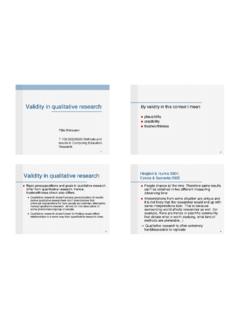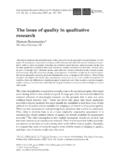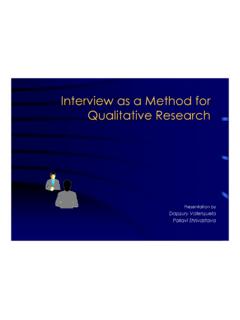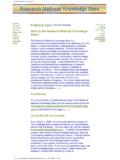Transcription of Qualitative research terms - ULHT Library Service
1 Qualitative research terms Case studies are in-depth studies of a cases (a 'case' can be a programme, an event, an activity, an individual) studied over time using multiple sources of information ( observations, documents, archival data, interviews). Can be exploratory, explanatory, descriptive, or a combination of these. Confidentiality means to respect the confidential nature of the information gathered during the research and preserve the anonymity of participants. Consent is the informed consent of participants and respect the right of respondents to refuse involvement. Must understand the nature of the project, the procedures that will be used and the use to which the results will be put.
2 Content analysis is a form of analysis that counts and reports the frequency of concepts/words/behaviours held within the data. The researcher develops brief descriptions of the themes and meanings, called codes. Similar codes may be grouped together to form categories. Context sensitivity is an awareness by a Qualitative researcher of factors such as values and beliefs that influence cultural behaviours Credibility is a researcher's ability to demonstrate that the object of a study is accurately identified and described, based on the way in which the study was conducted Data analysis is a systematic process of working with the data to provide an understanding of the participants' experiences.
3 Document analysis looks for occurrences of specific words or phrases in a document or interpret text to seek nuances of meaning and to consider context Ethnography is the study of groups and/or cultures over a period of time. The goal of this type of research is to comprehend the particular group/culture through observer immersion into the culture or group. Field Observation is the observation of participants in their natural setting. Observation can be direct or indirect, participatory or non-participatory. Framework analysis is where the objectives of the investigation are set in advance and shaped by the information requirements of the funding body; the thematic framework for the content analysis is identified before the research commences (a priori).
4 Grounded theory aims to generate a theory that is 'grounded in' or formed from the data and is based on inductive reasoning. This contrasts with other approaches that stop at the point of describing the participants' experiences. In terms of data analysis grounded theory refers to coding incidents from the data and identifying analytical categories as they emerge from the data, rather then defining them a priori Hawthorne effect is the impact of the researcher on the research participants or setting, notably in changing their behaviour. Holistic means exploration of a research question multi-dimensionally, exhaustively and in its entirety, preserving the complexity of human behaviour.
5 Knowledge and Information Service Inductive analysis is a form of analysis based on inductive reasoning; a researcher using inductive analysis starts with answers, but forms questions throughout the research process. Interviews are one of the main means of conducting Qualitative research . Interviews are usually: Focus groups - interviews of groups of people with something in common. Semi-structured follow a topic guide but allows for follow-up of points Unstructured aims to discuss a limited number of topics in great depth no structure or pre-conceived plan. Iteration relates to the process of repeatedly returning to the source of the data to ensure that the understandings are truly coming out of the data.
6 In practice this means a constant process of collecting data, carrying out a preliminary analysis, and using that to guide the next piece of data collection and continuing this patterns until the data collection is complete. Phenomenology seeks to describes or explains phenomena. Reflexivity is the open acknowledgement by the researcher of the central role they play in the research process. A reflexive approach considers and makes explicit the effect the researcher may have had on the research findings. Respondent validation refers to seeking the participants' views of the initial interpretations of the data. The aim is to ensure that the participants and the researcher are in agreement as to the meaning of the data, but that the researcher has the opportunity to incorporate the participants' responses into the analysis.
7 Rigour is the degree to which research methods are scrupulously and meticulously carried out in order to recognize important influences occurring in a experiment. Sampling is the process of selecting participants to take part in the research on the basis that they can provide detailed information that is relevant to the enquiry. Purposive sampling is the selection of participants who have knowledge or experience of the area being investigated. Types of purposive sampling include: Typical case chosen because thought to be like the majority Maximum variation identify the diverse characteristics of the population and then sample people that match these characteristics Snowball ask people who else might be usefully interviewed.
8 Theoretical sampling is one in which the objective of developing a theory or explanation guides the process of sampling and data collection. Convenience sampling the cases that can be studies most easily, cheaply or quickly, but it is the least credible. Thematic analysis see content analysis Transferability is the ability to apply the results of research in one context to another similar context. Also, the extent to which a study invites readers to make connections between elements of the study and their own experiences. Triangulation is the process by which the area under investigation is looked at from different perspectives.
9 These can include two or more methods, sample groups or investigators. Used to ensure that the understanding of an area is as complete as possible or to confirm interpretation through the comparison of different data sources. Validity asks whether the interpretation placed on the data accords with common sense and is relatively untainted with personal or cultural perspective. (see also credibility)








